 导语 Intro
导语 Intro
On November 21, 2017, "2017 Training on Compliance Mechanism for Financial Institutions in Overseas Environmental and Social Risk Management” was successfully concluded in Beijing. The one-day long training was co-organized by G:HUB and the China Banking Regulatory Commission, and was also supported by the Green Finance Committee of China Finance Society. The training attracted a total of 56 guests from a number of Chinese financial institutions including China Development Bank, Export-Import Bank of China, Bank of China, Industrial and Commercial Bank of China, China Construction Bank and Agricultural Bank of China.
The training invited top experts from international multilateral development banks including the World Bank, ADB, IFC and AIIB, and experts from domestic financial regulators, domestic financial institutions, civil think tanks and legal community who have extensive operational experience in environmental and social risk management and regulatory compliance These top experts shared with the audience good international practice widely accepted by the international community, existing dispute solving practice arising from investments and regulatory practices and case analysis on accountability, as well as policies and initiatives on environmental and social risk management of Chinese financial institutions in overseas investment.
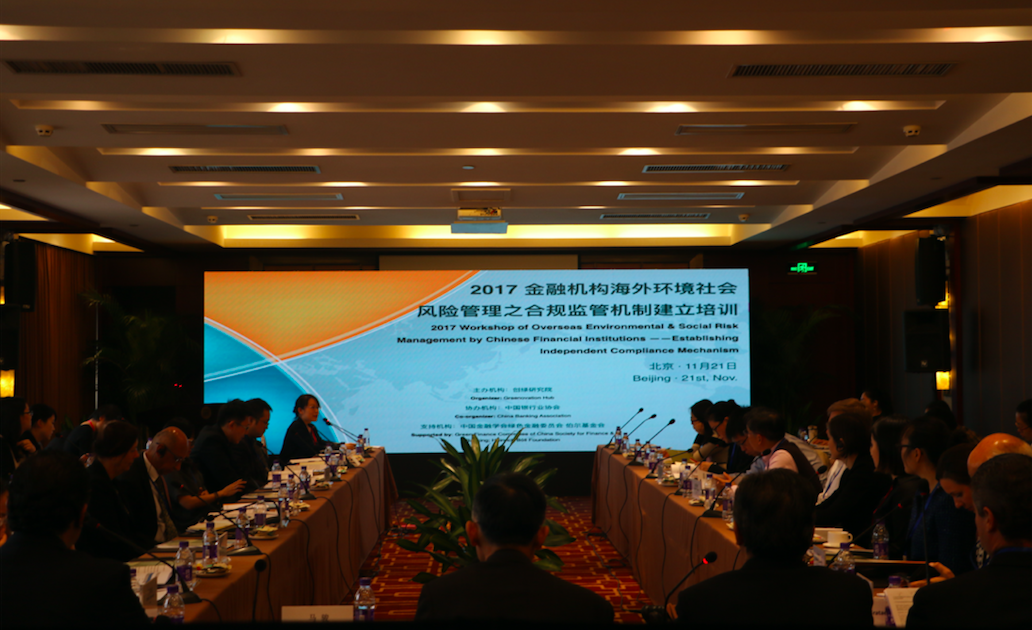
 背景 Background
背景 Background
The "Belt and Road Initiative" is an important platform for deepening cooperation and achieving common prosperity and development between China and countries along Belt and Road. In order to realize sustainable development in domestic governance and international cooperation, Chinese government has incorporated ecological civilization into the “Belt and Road" construction and aims to jointly building the green Silk Road with other countries along Belt and Road. Since BRI was proposed, Chinese enterprises speeded up in launching “going global” strategy. Although investments made by China institutions help boost local economic and social development, problems and challenges also arise in the process, such as ignorance of local laws and regulations as well as investment environment, inadequate attention to the local ecological environment and poor communication with local communities and NGOs, etc. All of these problems aroused dissatisfaction or one-sided understanding from the international community over China's overseas investment and caused investors to suffer double losses in reputation and property.
Overseas investment and financing often involve a series of complex issues that must be faced, such as the development of environmental resources, land acquisition, compensation for resettlement, community culture and ethnic minorities. Failure to properly handle one or all of the issues may trigger controversy, disputes and affect the project process ultimately, resulting in significant financial losses and detriment to the political reputation of the relevant financial institutions and their countries. In particular, when supporting investment and financing of "going global" strategies and "Belt and Road" projects, Chinese financial institutions will inevitably face financial and investments risks and if they fail to effectively identify and properly manage the environmental and social risks associated with their clients and investment projects. How to avoid and properly solve the environmental and social disputes in overseas financing, especially judicial proceedings triggered by the environmental and social risks of potential overseas financing projects has become common concern for governments, financial institutions, investors, communities where the project is located, and civil organizations.
In recent years, Chinese government formulated and promulgated corresponding policies and directives consecutively to manage and control risks and challenges arising from overseas investment. For instance, the "Guidelines on Green Credit" was issued by China Banking Regulatory Commission in 2012 and the "Guiding Opinions on Regulating Financial Institutions in Serving Going-out Strategies of Enterprises and Strengthening Risk Prevention and Control" was promulgated in 2017. Both policies require financial institutions to carry out environmental and social risk management in overseas business and establish a response mechanism for projects involving major risks, and promote the exchange and interaction with stakeholders.
Recently, seven major industry associations, including the China Banking Association, jointly issued the "Environmental Risk Management Initiative for China’s Overseas Investment” which also proposed to establish and improve the mechanism and internal processes for environmental risk management of enterprises in their overseas investment, and also strengthen environment Information disclosure. The policy documents listed above all require financial institutions or enterprises to strengthen the environmental and social risk management in overseas investment. However, how to embody these guidelines into operations entails continuously accumulation in knowledge and capabilities of Chinese banks. Through sharing and learning on good international practice widely accepted by the international community and existing dispute solving practice arising from investments and regulatory practices and case analysis on accountability,this training helped Chinese banks and investors learn from best international practices and strengthen internal institutional mechanisms building and enhance the management and control of environmental and social risks , which promotes green investments along “Belt and Road” and help China's financial institutions accumulate experience and create conditions to serve for national strategies.
 会议要点 Keypoints
会议要点 Keypoints
Ye Yanfei, inspector of the CBRC's Policy Research Bureau, said that the training, on one hand, provided relevant resources for Chinese banks to learn from international experience, strengthen their capacity-building and implementation capabilities, and open their minds to learn and explore their own suitable practices; on the other hand, multi-party communication platform can be established after the training, for example, we can establish a sharing mechanism for excellent solutions on environmental and social disputes , we also can invite national communities, NGOs and professional organizations from host countries to conduct regular communications with Chinese financial institutions , share their first-hand information related controversial overseas investment projects by Chinese banks and help solve the problem promptly to avoid investment losses or further damage to banks 's and even the country's reputation.
Jun Ma, Co-Chair of the G20 Green Finance Study Group and Director of the Green Finance Committee, delivered a speech on green investment and environmental risk management. Ma Jun said that many countries along the "Belt and Road" are facing severe environmental pressures such as air pollution and water scarcity. From the perspective of industrial development, development of traditional industries that are carbon-intensive with high emissions and low efficiency in the future will increase the environmental pressure on countries along the "Belt and Road" as they are in the early stages of industrial development. From an investment perspective, Chinese institutions investing and financing in these countries and regions also need to consider their own environmental risks and associated reputation risk. Therefore, it is necessary to emphasize the risk management in overseas investment both in terms of protecting local environment, developing local green economy and controlling risks. Against this background, on September 5, this year, seven industry associations and agencies including the Green Finance Committee and the China Banking Association jointly released the “Environmental Risk Management Initiative for China’s Overseas Investment." The initiative aims to encourage and guide China's financial institutions and enterprises to strengthen environmental risk management in their overseas investment and follow the principle of responsible investment and integrate the concept of ecological civilization and green development into the “Belt and Road" construction. The initiative will be further refined next year, and a series of similar follow-up training will be launched. G-Hub is engaged in the preparation of this initiative.
Gonzalo Casro de la Mata, Chairman of the Inspection Panel, World Bank, Tang Dingding, Chairman of the Compliance Review Panel of the ADB and Director of the Executive Directorate, and Osvaldo Gratacós, Vice President of IFC and President of Compliance Advisor Ombudsman, as well as Hamid Sharif, Director General of Compliance, Effectiveness, and Integrity unit, AIIB introduced the experiences of the multilateral development banks in building and implementing independent compliance mechanisms over the past years with the audience.
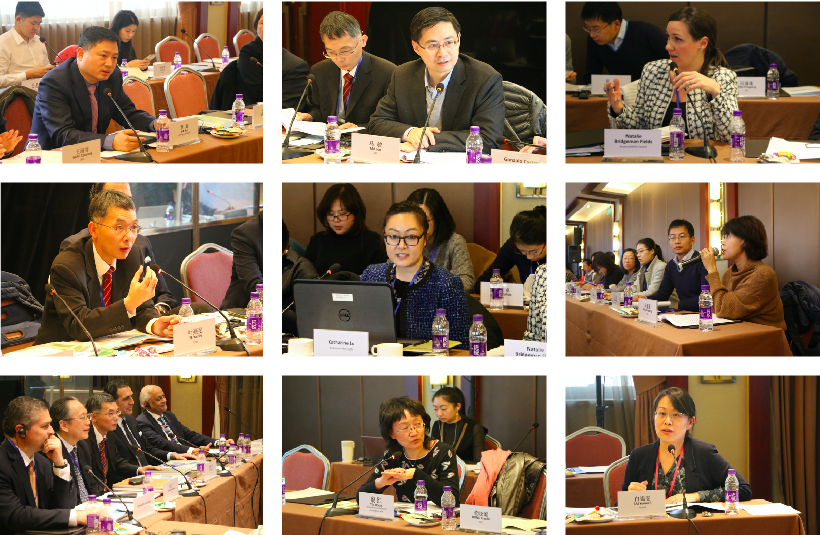
Tang Dingding said that ADB is willing to cooperate with China's banks. The Asian Development Bank plans to hold an international symposium on compliance mechanism in Beijing next year. Ten experts from Central Asian countries and five from the Mekong region will be invited to introduce and share international practices. The symposium is open to Chinese financial institutions to participate. Moreover, ADB is willing to invite staffs from two or three Chinese banks intending to establish such mechanism to visit Compliance Review Panel of the ADB for six months and conduct field study and establish "one-on-one" training model for capacity building.
As the only guest speaker from Chinese banks, Yin Hong, deputy director of the Institute of Urban Finance at Industrial and Commercial Bank of China, briefed audience on the practice of environmental and social risk management at ICBC and she said that the institutes is willing to make some preliminary research on regulatory compliance mechanisms. At present, the overseas business of ICBC is increasing, and environment and social risks in different countries are different and complex. In this respect, it is necessary to establish compliance mechanism, and she hoped ICBC can take the initiative in the process and extend its experience to other banks.
Natalie Bridgeman Fields, Founder and Executive Director of the Accountability Counsel, and Katharine Lu, Green Finance Project Manager of Friends of the Earth, shared their experience in developing and implementing independent compliance mechanism and overseas investment cases from perspective of civil NGOs. The Accountability Counsel has many years of experience in supervising the compliance mechanisms of financial institutions. Friends of the Earth are agencies that help to establish communication with investors in local communities. From the sharing of two experts from civil think tanks, we can see that many problems in these controversial overseas investment projects can be avoided and solved through the establishment of better communication channels and dispute resolution mechanisms.
Jia Hui from De Heng law firm said that international disputes can usually be settled through three means: judicial proceedings, international arbitration and conciliation. Conciliation is a simpler solution. Establishing an independent compliance mechanism can effectively enhance communication with stakeholders in the host countries and reduce the cost of dispute resolution, which are very important for financial institutions in overseas operation.
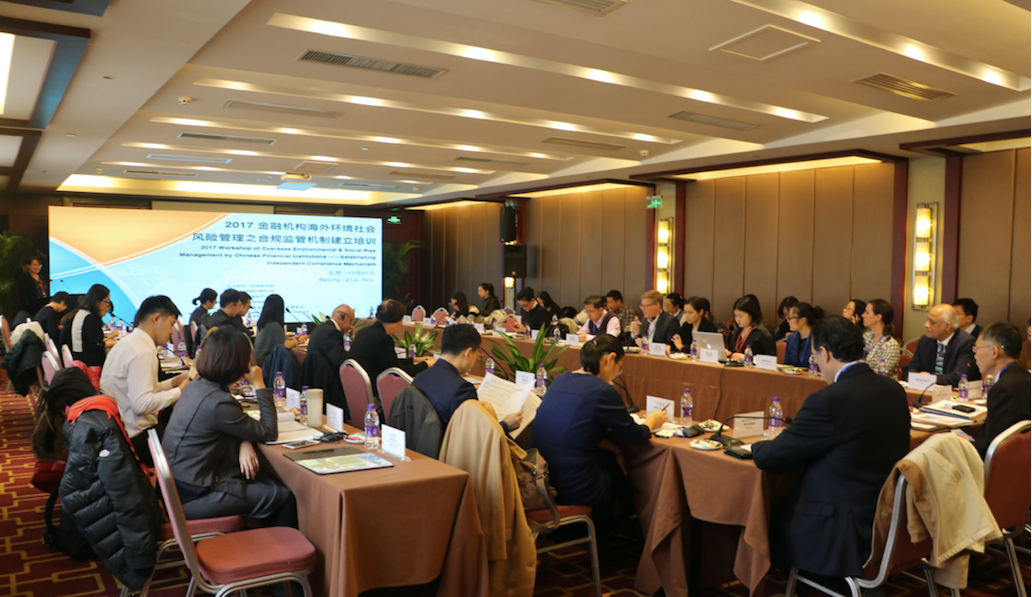
A discussion session was held during the training on which audience and experts discussed how to draw lessons from international experience in promoting China's financial institutions to establish a compliance mechanism that are in line with national conditions and also meet their own demands. Audience from the Chinese banking industry actively participated in the discussion and expressed their vision for establishing relevant regulatory compliance mechanisms in Chinese banks in the future.
 总结和愿景 Sum up & Looking Forward
总结和愿景 Sum up & Looking Forward
This training conference successfully established a platform for domestic financial institutions to explore and establish compliance, communication and problem-solving mechanisms. Experts and audience discussed in depth the importance of establishing relevant mechanisms to avoid environmental and social risks and enhance self-discipline of banks which provides the groundwork and opportunities for financial Institutions to promote effective environmental and social risk management. As to following up work, G-Hub and China Banking Association expressed willingness to do their utmost to support the further exploration and practice of financial institutions in capacity building on environmental and social risk management.
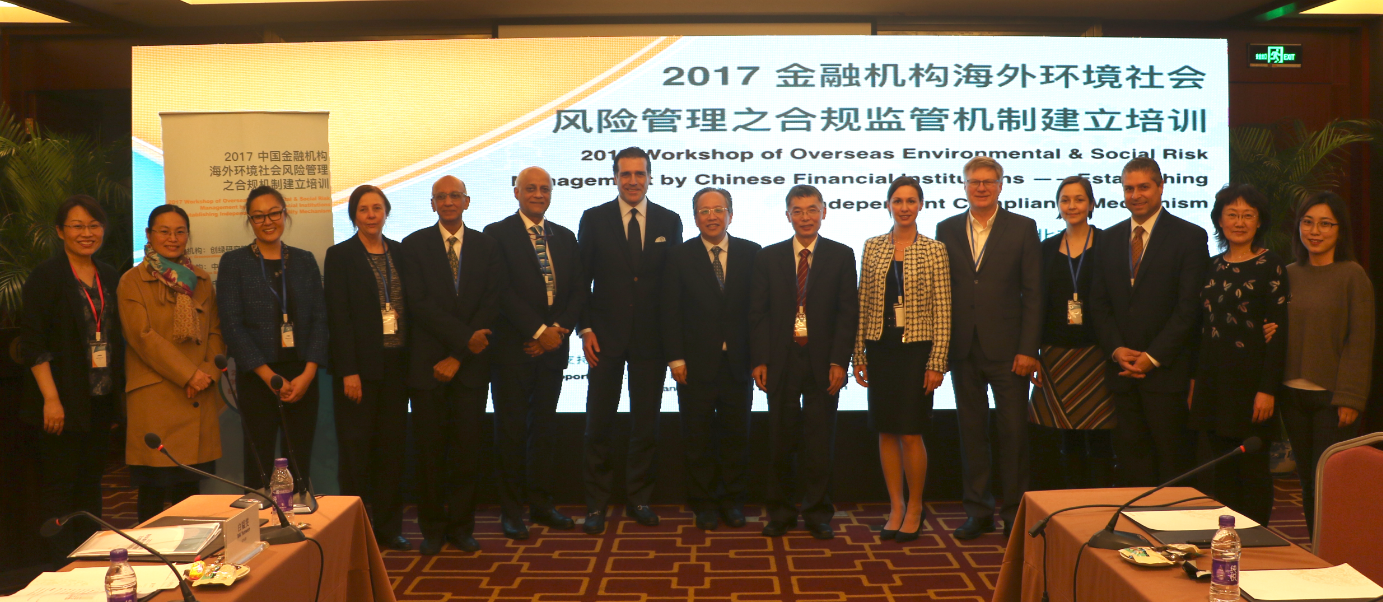
Download training handbook:
Photo/article:GHUB
Originally published on:China Green Finance Committee (Chinese)
If you would like to quote, using photo or forward the article, please contact policy@ghub.org for authorization.


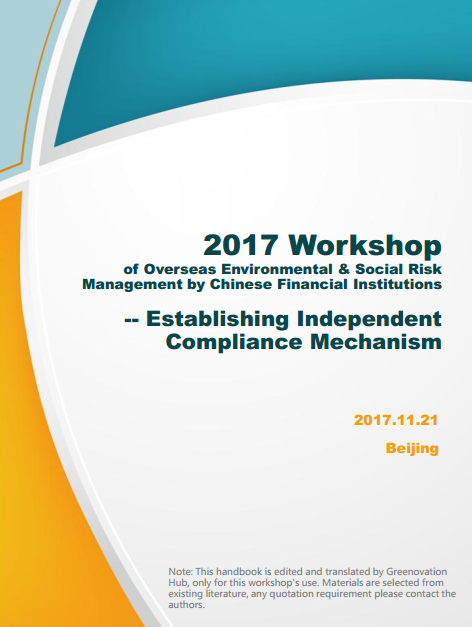
 PDF
PDF
